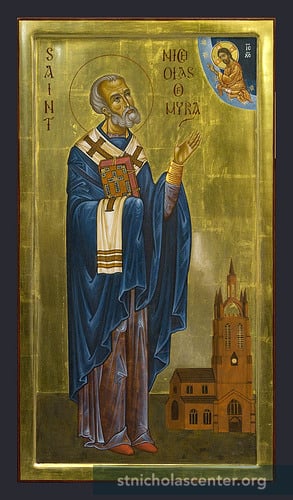St Nicholas Day Homily
by Fr. Lawrence Lew O.P.
Homily for Thursday in Week 1 of Advent
December 6, 2012, Edinburgh, Scotland
Isa 26.1-6; Ps 117; Matt 7.21. 24-27
In many countries today is celebrated as St Nicholas’ day, and small gifts are given to children in memory of the original Santa Claus who was the 4th-century bishop of Myra on the southern coast of Turkey. When I was a novice in Cambridge, we would leave our shoes out on the evening before the 6th of December, and on the morning of St Nicholas’ day, we would find little parcels of chocolates and other sweet treats in our shoes. This custom is based on one of many stories involving St Nicholas.
It is said that Nicholas heard of a poor man in his town who had three daughters. As the poor man could not afford to supply their dowry, the three girls were likely to remain unmarried, and thus in peril of being sold into slavery. So, on three separate occasions, St Nicholas anonymously threw bags of money to supply dowries for the three girls. These sailed through the open window of the house where they lived and are said to have fallen into shoes which the girls left to dry by the fire. Others say the money was wrapped in stockings, hence, sweet treats in shoes or stockings.
But, it’s important to notice that in fact St Nicholas’ gifts and legendary generosity were not about indulging a sweet tooth nor simply giving children stocking fillers to amuse and entertain them. His actions were much more important, fundamentally grounded in what people needed, namely, freedom. St Nicholas’ good deeds and generosity actually changed lives by providing opportunities for the poor, raising them up above the rich and powerful, as Isaiah suggests in the first reading. For many people, God’s salvation and liberation is first experienced through social justice, through being freed from cold and hunger, liberated from slavery to addictions, released from the helpless situations into which poverty traps him or her.
So, in taking practical actions which set people free, our actions – like St Nicholas’ – reflect the fundamental liberation that we have been given in Jesus Christ: a freedom from sin which is never just spiritual but which also affects the whole human person in spirit and body. As the Catechism says: “In its various forms - material deprivation, unjust oppression, physical and psychological illness and death - human misery is the obvious sign of the inherited condition of frailty and need for salvation in which man finds himself as a consequence of original sin” (CCC 2448).
Hence, the Church works to bring Christ’s liberation to the whole human person, setting us free from all that is evil. So, she has a “preferential love for the poor” which calls us to “work for their relief, defense, and liberation” (ibid.). This kind of good work, a practical, life-changing, saving work; an advocacy for the oppressed, the poor, and down-trodden of society, is precisely what Jesus praises in the Gospel as “the will of my Father in heaven”. So, today’s Gospel warns us that merely having a perfectly orthodox faith in the Lord, but not acting on that faith to put love into action is dangerous. This is the challenge of the Gospel to us today: that as the Lord has come to set us free, so we are called to set others free and to oppose injustice, so that the poor, the unloved, the marginalized will also know the advent of our salvation in Christ. In short, we’re called to be like the true Santa Claus.
By Lawrence Lew, O.P., from Releasing the Arrow. Used by permission.


